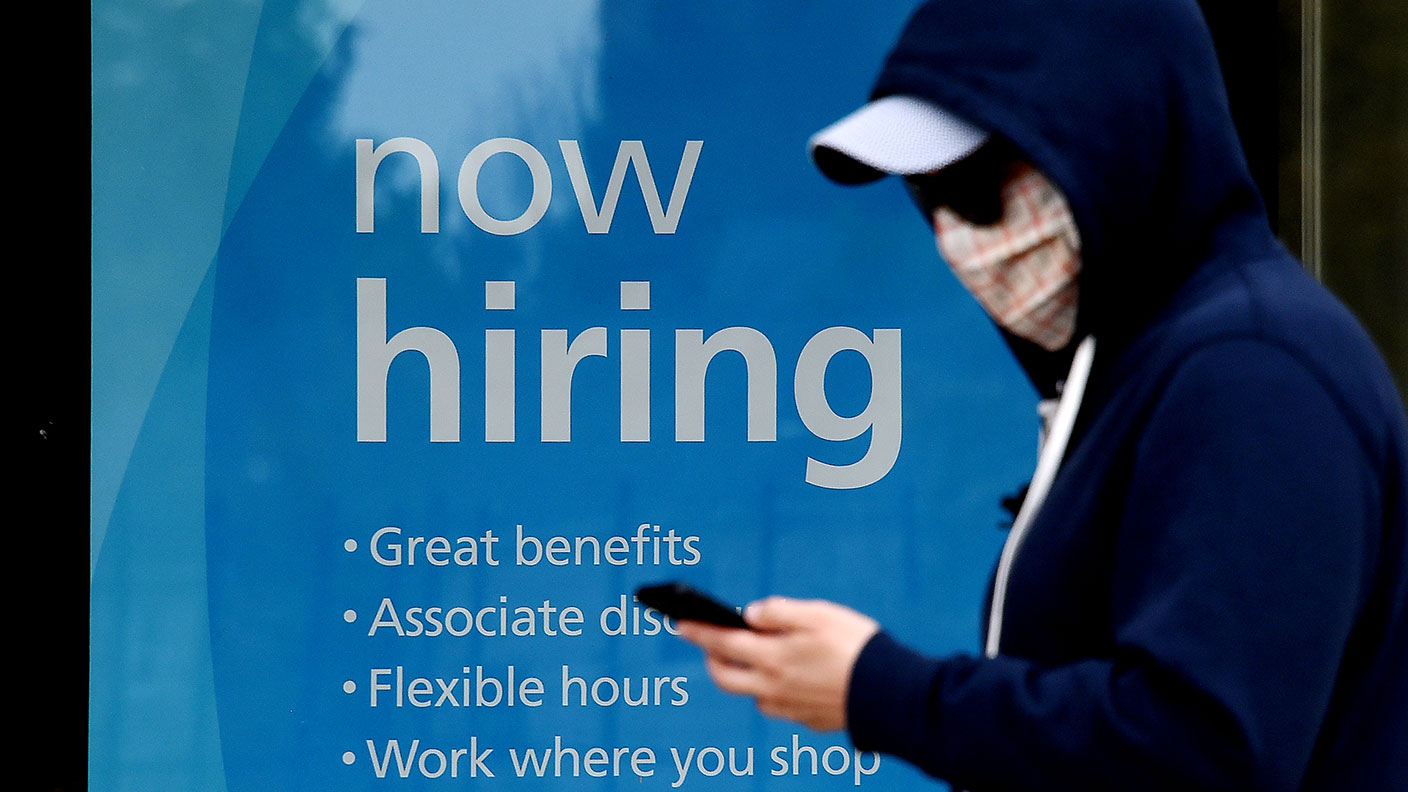The charts that matter: it’s starting to look a little unhinged out there
Things aren't normal in the markets right now, says John Stepek. Here, he looks at the charts that matter most to the global economy for clues to what's going.

Get the latest financial news, insights and expert analysis from our award-winning MoneyWeek team, to help you understand what really matters when it comes to your finances.
You are now subscribed
Your newsletter sign-up was successful
Want to add more newsletters?

Twice daily
MoneyWeek
Get the latest financial news, insights and expert analysis from our award-winning MoneyWeek team, to help you understand what really matters when it comes to your finances.

Four times a week
Look After My Bills
Sign up to our free money-saving newsletter, filled with the latest news and expert advice to help you find the best tips and deals for managing your bills. Start saving today!
Welcome back. If you haven’t put the date in your diary yet, remember to keep Friday 22 May free for our big investment event – you really won’t want to miss it. More news on that shortly – we’re lining up the speakers even as I type.
On the podcast front meanwhile – this week I interviewed Dominic Frisby about his new book Daylight Robbery. If you haven’t bought it yet, you should. Dominic has written a page-turner about tax, which you would have thought impossible. You can hear more about it – and more about his wishlist for next month’s Budget – right here.
Here are the links for this week’s editions of Money Morning in case you missed any.
MoneyWeek
Subscribe to MoneyWeek today and get your first six magazine issues absolutely FREE

Sign up to Money Morning
Don't miss the latest investment and personal finances news, market analysis, plus money-saving tips with our free twice-daily newsletter
Don't miss the latest investment and personal finances news, market analysis, plus money-saving tips with our free twice-daily newsletter
- Monday: The biggest risk facing the UK housing market right now
- Tuesday: Apple’s coronavirus warning won’t be the last – but will markets care?
- Wednesday: The euro’s slide against the US dollar looks set to continue
- Thursday: Britain’s economy might spring a surprise on the doomsayers this year
- Friday: Gold is at its highest level in years – here’s how to invest
Subscribe: Get your first 12 issues of MoneyWeek for £12
Get 40% off my book: Buy The Sceptical Investor and type in the code SCEPTICAL40 at the checkout. Or get it free on audio if you join Audible at the same time.
Michael Taylor also wrote about the big stramash over Sirius Minerals and what you should be doing now if you own shares in the mining minnow.
The charts that matter
The US yield curve – as measured by the gap between the yield on the ten-year US Treasury (government bond) and the two-year – flattened further this week. The gap between the two is almost negative again.
If it turns negative then that means the yield curve has inverted, which means that the US government is paying more to borrow over two years than to borrow over ten, which only makes sense if you think long-term prospects for the economy are ugly.
Inversion is a recession signal, and the curve already inverted in the middle of last year. So in a way, movements in the yield curve are now quite academic – either we get a recession in the next 18 months or so, or it means the original inversion was a false signal.
Still, it’s not encouraging – this isn’t the normal way of things and it’s clear that despite soaring stocks, markets are not at all sanguine about what’s going on in the world right now. Oh, and the 30-year yield hit an all-time low on Friday, which does not bode well.

(The gap between the yield on the ten-year US Treasury and that on the two-year: three months)
Gold (measured in dollar terms) had a very strong week this week, even as the US dollar headed higher too. I wrote about this yesterday – long story short, it’s mostly about currency debasement.

(Gold: three months)
The US dollar index – a measure of the strength of the dollar against a basket of the currencies of its major trading partners – just keeps pushing higher. I don’t keep a note of it here, but a lot of traders got very excited this week after the Japanese yen “broke out”. In other words, the Japanese currency weakened sharply past a point of “resistance” (ie a long-held area at which the yen had previously tended to bounce).
Does this mean the dollar is set to explode higher? A chart can’t predict the future. But it can indicate that maybe something you thought was unlikely (an even stronger dollar) has become more likely.
I had expected the dollar to get weaker this year, but I have to acknowledge that this hasn’t happened yet. And if stocks keep going up, then maybe the pressure won’t be great enough to persuade the Federal Reserve to do what it would take to get the dollar lower (printing money, cutting rates, and all the rest of it).

(DXY: three months)
As the dollar strengthened, so the Chinese yuan (or renminbi) weakened. This week it rose above the ¥7/$1 mark which used to be seen as a “line in the sand” for the Chinese authorities. The risk is that the weaker the yuan gets, the higher tensions rise between China and the US. Perhaps more importantly, the weaker the yuan, the greater the risk of a deflationary impulse that would panic global markets.

(Chinese yuan to the US dollar: since 25 Jun 2019)
The yield on the ten-year US government bond fell further as the craving for US assets continued.

(Ten-year US Treasury yield: three months)
The yield on the Japanese ten-year fell a little, and remains marginally negative.

(Ten-year Japanese government bond yield: three months)
The yield on the ten-year German bund fell further as fears over the impact of the coronavirus on the eurozone’s biggest economy continued to worry investors.

(Ten-year Bund yield: three months)
Copper is holding the line for now. The metal is sometimes deemed “Dr Copper” – the joke is that it has a PhD in Economics. Copper is so widely used that a fall in its price signals global economic weakness, while rising copper suggests acceleration. As with everything market-related, it’s more complicated than that, but it’s worth keeping an eye on even so.

(Copper: six months)
I do find it interesting to contrast copper – seen as fairly China dependent – with the state of the Aussie dollar. Australia is being hit by a double whammy. The economy has been wobbly for a while (partly because China was already slowing) and now the coronavirus promises to make the situation worse.

(Aussie dollar vs US dollar exchange rate: three months)
Cryptocurrency bitcoin is rolling around in the region of the $10,000 mark. Earlier in the week it had one of those sudden mini-crashes that bitcoin often has (another good reason why trying to trade this thing is very very high risk). No one seems to have any idea why it happened.

(Bitcoin: ten days)
US weekly jobless claims rose a little to 210,000 (from 206,000 – the previous week’s figures were revised higher by 3,000 claims). As a result, the four-week moving average now sits at 209,000, which is its lowest level in nearly a year.
When the four-week moving average troughs, the market often tops soon after. But so far the jobless data remains an unequivocal bright spot for the US economy.

(US jobless claims, four-week moving average: since January 2016)
The oil price (as measured by Brent crude, the international/European benchmark) continued to claw back ground over the week although it fell on Friday as coronavirus fears flared up again.

(Brent crude oil: three months)
Internet giant Amazon dipped along with the wider market.

(Amazon: three months)
As for electric car group Tesla – it ended the week a mere 10% or so higher than it ended last week, so nothing that will excite the loyal fans of Elon Musk. The rest of us can only watch in astonishment, of course, but who knows? Maybe the world will turn electric faster than we think.

(Tesla: three months)
Have a great weekend.
Get the latest financial news, insights and expert analysis from our award-winning MoneyWeek team, to help you understand what really matters when it comes to your finances.

-
 Can mining stocks deliver golden gains?
Can mining stocks deliver golden gains?With gold and silver prices having outperformed the stock markets last year, mining stocks can be an effective, if volatile, means of gaining exposure
-
 8 ways the ‘sandwich generation’ can protect wealth
8 ways the ‘sandwich generation’ can protect wealthPeople squeezed between caring for ageing parents and adult children or younger grandchildren – known as the ‘sandwich generation’ – are at risk of neglecting their own financial planning. Here’s how to protect yourself and your loved ones’ wealth.
-
 Is the US in recession and does it matter?
Is the US in recession and does it matter?Analysis There's a heated debate over whether the US is in recession or not. But why does it matter? John Stepek explains
-
 Has the chancellor done enough to save the UK from recession?
Has the chancellor done enough to save the UK from recession?Analysis UK Chancellor Rishi Sunak announced a new package last week to ease the cost of living crisis. John Stepek explains whether the risk of a UK recession still remains.
-
 Is the UK too open to overseas takeovers?
Is the UK too open to overseas takeovers?Analysis Data shows that the UK is more open to overseas takeovers than other major markets. John Stepek asks: should investors care?
-
 How to manage your money as inflation just keeps rising
How to manage your money as inflation just keeps risingAnalysis Uk inflation is at a 30-year high – and it won't be falling any time soon. So what can you do? John Stepek explains how to manage your money to combat rising prices.
-
 Inflation is going to stay even higher for even longer
Inflation is going to stay even higher for even longerAnalysis Commodity prices – everything from energy to food – are going through the roof. And that’s not likely to end any time soon, says John Stepek. Here's what that means for how you invest.
-
 Inflation is incredibly inconvenient, as we’re all about to learn
Inflation is incredibly inconvenient, as we’re all about to learnAnalysis Inflation doesn't just eat into your wealth, it eats into your time – and can be devastating for those on the lowest incomes. And it's not going away any time soon, says John Stepek. Here's how to invest.
-
 The cost of living crisis is global – US inflation just hit another 40-year high
The cost of living crisis is global – US inflation just hit another 40-year highAnalysis With US inflation running at 7.5%, it’s clear that the cost of living crisis is not confined to the UK. John Stepek looks at the likely reaction from governments and central banks, and what it means for you.
-
 The strong US jobs report is good news for the economy, but not so much for markets
The strong US jobs report is good news for the economy, but not so much for marketsAnalysis January's US jobs report came in much stronger than anyone was expecting, with 467,000 new jobs added to the economy. But things might not be quite as rosy as they seem, says John Stepek. Here's why.